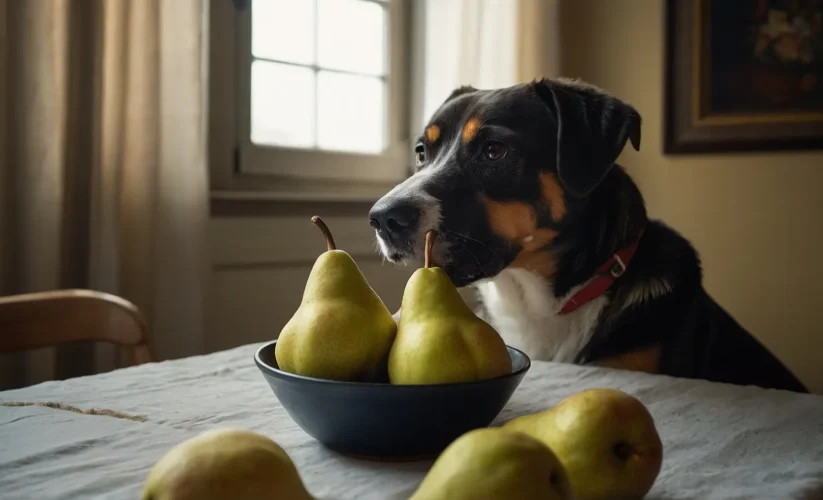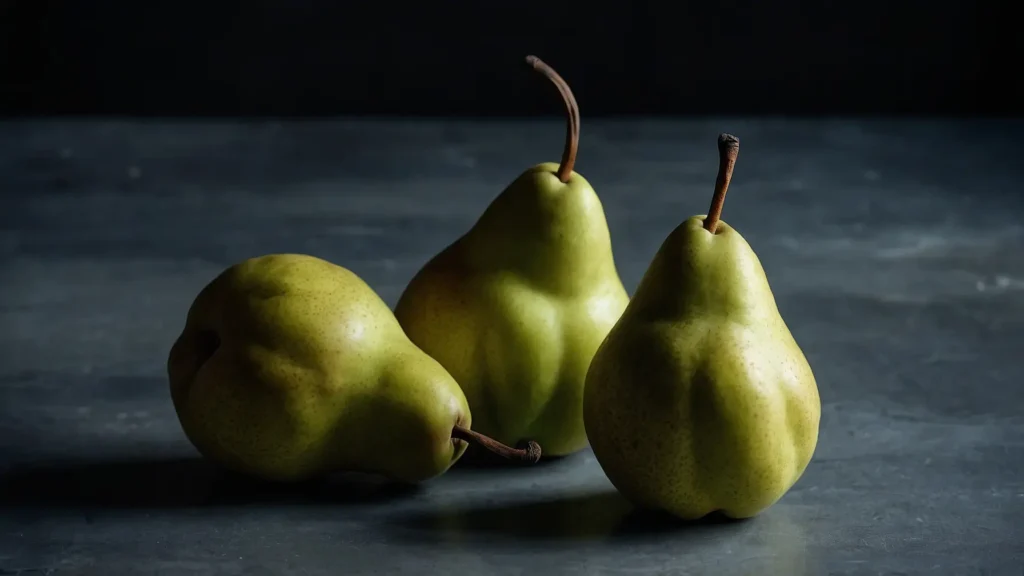Can Dogs Eat Pears?

In the vast world of canine nutrition, the question of whether dogs can safely consume human foods often arises, with fruits being a particularly common topic of interest. “Can Dogs Eat Pears?” explores this query, focusing on the juicy sweetness and nutritious profile of pears, which are no exception to the curiosity. As a dog owner and experienced blogger in the canine world, I’ve delved deep into the subject to provide fellow pet enthusiasts with a well-rounded perspective. This exploration is not only about pears but also extends to other fruits like avocados, bananas, cranberries, mangoes, oranges, and cherries, aiming to offer a comprehensive guide on what’s beneficial and what’s potentially harmful. Understanding the dietary needs and restrictions of our furry friends is paramount to ensuring their health and happiness, and this guide aims to shed light on the role fruits can play in their diet.
Is Pears Good for Dogs?
Pears are a nutritious snack for humans, and the good news is, they can be just as beneficial for dogs when given in moderation. This fruit is rich in dietary fiber, which is essential for maintaining a healthy digestive system in canines. Pears are also packed with vitamins A and C, which support the immune system and skin health, and are a source of antioxidants that help fight off disease-causing free radicals.
However, the key to incorporating pears into your dog’s diet is moderation. The natural sugars found in pears, while not harmful in small amounts, can lead to obesity and dental issues if consumed in excess. Furthermore, it’s crucial to prepare pears properly for canine consumption. This means removing the core and seeds, which contain traces of cyanide, and peeling the skin to minimize the risk of pesticide exposure. Offering small, bite-sized pieces can also prevent choking hazards and ensure that your dog can safely enjoy this tasty treat.
Is Pears Bad for Dogs?
Despite the benefits, there are circumstances under which pears could be bad for dogs. The primary concern revolves around the pear seeds, which, as mentioned, contain cyanide. Though the amount is small and not typically dangerous in limited quantities, ingestion of multiple seeds could pose a health risk. Furthermore, the high fiber content, while generally beneficial, can lead to digestive upset in some dogs, especially if they consume too much pear or are not accustomed to fiber-rich foods.

Another potential issue is the sugar content in pears. Dogs with diabetes or those prone to obesity should consume pears sparingly, as the natural sugars can affect blood sugar levels and contribute to weight gain. Always consult with a veterinarian before introducing new foods into your pet’s diet, particularly if they have existing health conditions.
Are Other Fruits Safe For Dogs?
When it comes to other fruits, the safety and health benefits can vary widely:
- Avocados: Contain persin, which can be toxic to dogs in large quantities. It’s generally advised to avoid giving avocados to dogs.
- Bananas: Safe in moderation, bananas are low in cholesterol and sodium but high in sugar, so they should be a treat rather than a staple.
- Cranberries: Both fresh and dried cranberries can be safe for dogs in small quantities but may cause stomach upset in some.
- Mangoes: Another safe option when peeled and pit removed, mangoes are rich in vitamins but also high in sugar.
- Oranges: Safe in small amounts, oranges can provide vitamin C, potassium, and fiber, but their acidity might not agree with all dogs.
- Cherries: With the exception of the flesh, all parts of cherries are toxic to dogs, so it’s generally best to avoid them to prevent the risk of cyanide poisoning.
Final Thoughts
Incorporating fruits like pears into your dog’s diet can offer a variety of health benefits, but it’s important to approach this practice with caution and knowledge. Always prioritize your pet’s safety by properly preparing fruits and serving them in moderation. While pears and certain other fruits can be healthy snacks, it’s crucial to remember that every dog is unique, and what works for one may not work for another. Always consult with your veterinarian before introducing any new foods into your dog’s diet to ensure they align with their specific health needs and dietary restrictions. By doing so, you can enjoy the process of discovering new treats that your dog loves, while keeping their health and wellbeing at the forefront.










